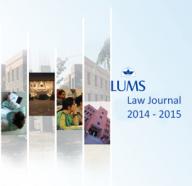
We are very excited to announce Volume 2 of the LLJ. As our readership may note, there is a notable change in the Journal’s format. While retaining the Articles section from last year’s volume, we substituted the Comments section for Case Notes on important decisions of the Superior Courts in recent years. Our hope is that the Journal would serve the dual purpose of inviting debate on important legal issues, as well as educating our readers on the technical facets of court decisions coming out of the Supreme Court of Pakistan, the High Courts, and the Federal Shariat Court. This Issue contains contributions by law students, academics and practicing lawyers.
In comparison to last year’s edition, we decided that a greater variety of subjects should be explicated in this Volume. There are three Articles, addressing available tests for Judicial Review, the discourse on Secularism and the semantics of Khul‘ under Islamic Law.
Hamaad Mustafa’s Article provides a comparative analysis of the Wednesbury reasonableness test and the proportionality test as yardsticks of Judicial Review of executive actions, and argues that the proportionality test provides an analytically clearer framework for channelling the court’s inquiry into executive actions in a more transparent and accurate manner, thus proving a more reliable test for the review.
Abbas Ali Lotia’s Article looks to reorient the debate on secularism by suggesting that the matter deserves scrutiny from a Foucauldian lens. His work looks at seminal texts on secularism from the fields of political science and anthropology to propose a new way of analysing secularism. This is done by focusing on a devolved conception of power which looks beyond legislative texts, and legal and political systems, to challenge how secularism has been understood in India and Pakistan.
In his Article, Dr Muhammad Munir sheds light on different jurisprudential stances taken by the Islamic Schools on the controversial law of Khul‘, and provides a comprehensive survey of the major points of contention. He also analyses the case law produced by the superior courts in Pakistan on this issue.
In addition to the Articles, there are six Case Notes which have been included in the LLJ this year. Each Note covers a recent court decision that has raised and answered interesting points of law.
Waqqas Mir’s Note on District Bar Association (Rawalpindi) v Federation of Pakistan discusses the ruling of the Supreme Court of Pakistan on the consolidated petitions challenging the 18th and 21st Amendments to the Constitution of the Islamic Republic of Pakistan 1973. He argues that the increase in judicial power with respect to constitutional amendments is actually weakening the democratic ideals the country vows to uphold.
Salman Ijaz’s Note on Saleem Ahmed v Government of Pakistan discusses the first instance of the Federal Shariat Court’s acknowledgment that the right to Khul‘ can be unilaterally exercised by a wife without the consent of her husband.
Hiba Fatima’s Note on Ghazala Tehsin Zohra v Mehr Ghulam Dastagir underlines the importance of the judgment from the perspective of the law on paternity and the corresponding duty of the father to provide maintenance to the child.
Kamran Adil’s Note on Zahid Rehman v The State discusses the ongoing ambiguity concerning the status of our legal system, which appears to be ‘in limbo’ between Common law and Islamic law. Through a discussion of this case, he attempts to make a broader point about the detrimental effects that this ambiguity has on the ability of judges to dispense justice uniformly.
Orubah Sattar Ahmed’s Note analyses Nadeem Masood v The State, which presents a new and bold interpretation of the Sections 544 and 545 of the CrPC as applicable in suits for compensation claimed on behalf of children born of rape.
No work is complete unless it acknowledges the efforts of the people who made it possible. We are immensely grateful to our Faculty Advisor, Dr Zubair Abbasi. We are equally grateful to Professors Marva Khan and Professor Khyzar Hussain for their invaluable insight and direction. We would like to acknowledge the support and encouragement of Dr Ali Qazilbash, and the Vice Chancellor, Dr Sohail Naqvi, who took personal interest in the publication of this Journal.
We are grateful to the outgoing and existing members of the LLJ Editorial Committee for their hard work in reviewing and editing several articles. We specially thank Maham Naweed, Abbas Ali Lotia, Muhammad Mustafa Mirza, Junaid Alam, Sara Mansoor Ansari, Hina Nadir Bandealy, Muhammad Zain Awan, Fatima Atta, Obaid Basit, Maria Khan, Naima Qamar, Muhammad Khursheed Siddiqi, Hiba Fatima, Shakoh Zulqurnain, Taha Abdus Samad and Rana Ali Yar Khan

